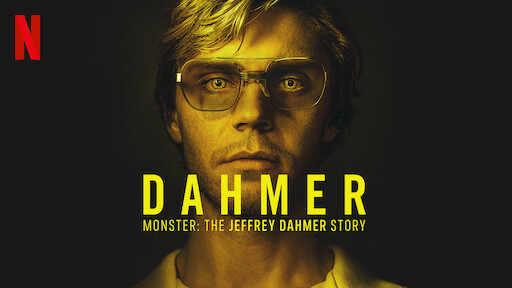Dahmer: Entertainment at the Price of Dignity

Photo courtesy of Netflix
Netflix’s new hit show ‘Dahmer – Monster: The Jeffrey Dahmer Story’ skyrocketed to over 1 billion hours of watch time, spending 7 weeks as one of the site’s top ten most popular shows.
The Jeffrey Dahmer Story is characterized by the grizzly events that occurred between 1979 and 1991 when Jeffery Dahmer killed 17 men, eating some of them. Through striking visuals and effects, Netflix’s new show tells a cautionary tale via a sensory overload of hatred, sympathy, and horror. However, many harsh critiques and controversies have arisen questioning the value of a show depicting such a violent tale.
“We’re all one traumatic event away from the worst day of your life being reduced to your neighbor’s favorite binge show,” cousin of Dahmer victim Errol Lindsey, Eric Perry, said.
Director Ryan Murphy has a record of emotionally distressing biopics. Whether it is recounting the court cases of O.J. Simpson and former United States president Bill Clinton, or the assassination of Gianni Versace, the filmmaker is clearly interested in depicting real life events. He explained that when creating the series, his interest did not only revolve around telling the story about Jeffery Dahmer being a “monster”, but rather what led him to become one.
“Ryan sent me the scripts and then called and said “You know, Dahmer is interesting in that he is almost regretful, and has guilt and sort of confusion on what went on. He doesn’t really have the charming mischievous smile. He’s a docile, sort of aloof, and almost dissociated from what he did,” actor Evan Peters said.
Throughout the series, the story plays with time, jumping from Dahmer’s childhood to his imprisonment. Along the way it explores his problematic upbringing, family dynamics, high school experience and early 20’s in relation to the killer’s “current” situation in 1991.
However, Dahmer’s dramatization of the cannibal killings has been a polarizing topic. Most of the series’ outrageous and disturbing events really happened, and this is especially true for the constant case of institutional malpractice haunting this case. For example, one of Dahmer’s victims, 14-year-old Konerak Sinthasomphone, might have been spared had police not ignored a report by Dahmer’s black neighbor Glenda Cleveland. This raises deeper implications on the roles racism and homophobia played in allowing Dahmer to get away with what he did for so long.
“It was the biggest thing I’ve ever seen that really sort of examines how easy it is to get away with things with the white privilege aspects,” Murphy said.
Regardless, such a focus on accuracy has brought some unwanted scrutiny to both Ryan Murphy and Netflix. There were scenes in which dramatization was used to shock or sadden the audience. For instance, when looking into Episode four’s victim Tony Hughes, most of his conversations with Dahmer were completely invented by the show’s writers, ignoring the tightly bound non-fiction narrative the series delivers. For actor Evan Peters it was an arduous task, as his script obligated him to stick to character.
“Honestly, I was very scared about all the things that he did. Diving into that and trying to commit to that was absolutely going to be one of the hardest things I’ve ever had to do in my life. I wanted it to be very authentic, but in order to do that, I was gonna have to go to really dark places and stay there for an extended period of time,” said Peters in an interview with Netflix.
On the other hand, many think the production’s relationship with the victims was ‘unfair’ and practically ‘non-existent.’ Rita Isbell, sister of victim Errol Lindsay, wrote an essay for The Insider speaking out on her opinion on the show.
“I was never contacted about the show. I feel like Netflix should’ve asked if we mind or how we felt about making it. They didn’t ask me anything. They just did it. ” Rita Isbell said.
Netflix has been accused of corporate greed and exploitation by those who believe they exploited such a sensitive story for money.
“If the show benefited them in some way, it wouldn’t feel so harsh and careless. It’s sad that they’re just making money off of this tragedy. That’s just greed. ” Rita said
In defending the project, Director Murphy points out that throughout the three and a half years he and his team researched, none of the more than 20 victims’ families or friends responded to their attempts to reach out.
Others have also come forward with criticism after they’ve made their own investigations on the subject. Some critics think there should not be more light shed on the story.
“By recreating (however ‘faithfully’, whatever that means) the most traumatic moments of these families’ lives, they are doing a grave disservice to the very people Murphy and co. want us to empathize with.” Aditya Mani Jha said in the article “Netflix’s DAHMER is slick, well-produced—and should not exist”.
In humanizing Dahmer through drama, the show seeks to offer some reflection of his character, not to excuse or empathize with it. The show’s innovative style and phenomenal camerawork will keep you hooked until the end, ripping your emotions out and making you feel the fear that such a monster instilled in the lives of many.
“It’s called The Jeffrey Dahmer Story, but it’s not just him and his backstory: It’s the repercussions, it’s how society and our system failed to stop him multiple times because of racism, homophobia,” Peters said. “It’s just a tragic story.”



